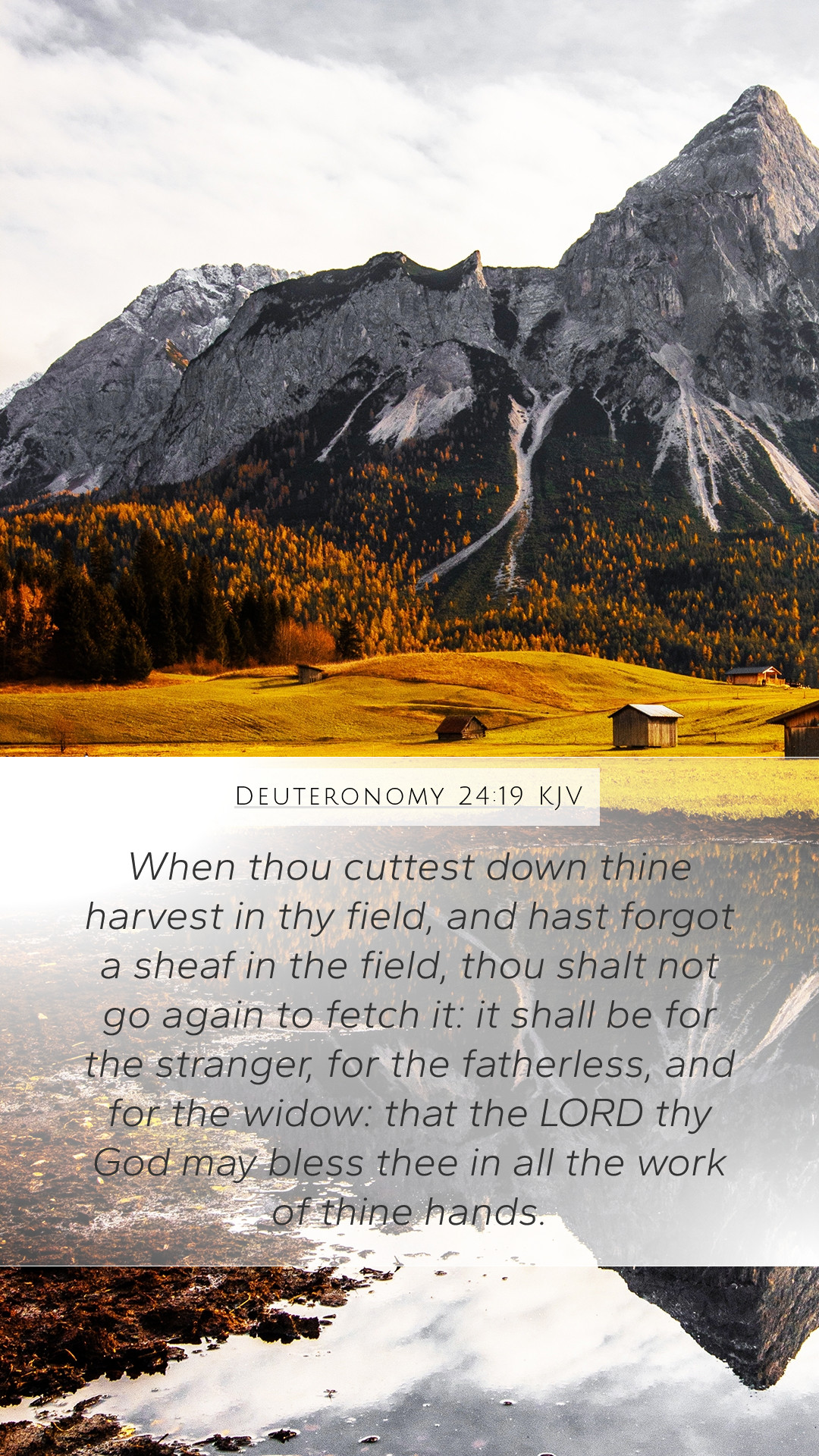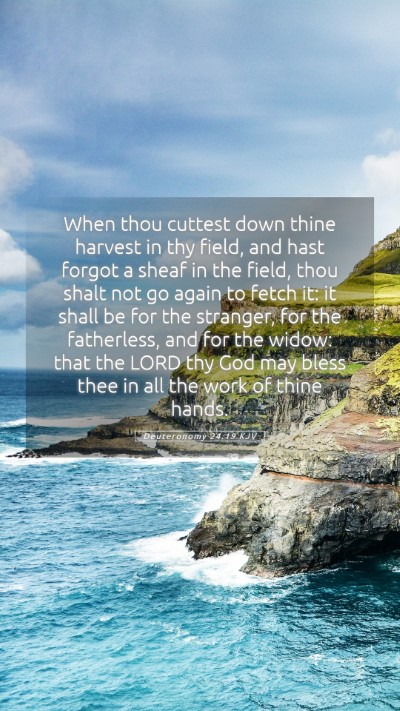Understanding Deuteronomy 24:19
Deuteronomy 24:19 states:
"When you reap your harvest in your field and forget a sheaf in the field, you shall not go back to get it; it shall be for the stranger, the fatherless, and the widow, that the Lord your God may bless you in all the work of your hands."
Summary of the Verse
This verse emphasizes the importance of generosity and compassion in the context of harvesting. The Lord commands that any forgotten sheaves of grain should be left for the marginalized members of society, including strangers, the fatherless, and widows. This act of kindness is linked to God's blessing on the work of one's hands.
Detailed Commentary
Insights from well-known public domain commentaries provide a deeper understanding of this scripture. Here are some interpretations from Matthew Henry, Albert Barnes, and Adam Clarke:
-
Matthew Henry's Commentary:
Henry explains that this command illustrates divine providence and care for the vulnerable. He highlights the positive virtue of selflessness and how the Lord desires His people to assist those in need. This act not only fulfills the law but enhances the spiritual character of believers, embodying God's love through tangible actions.
-
Albert Barnes' Notes:
Barnes elaborates on the cultural significance of this practice in ancient Israel. He notes that leaving grain for the needy is a reflection of the societal obligation to support those who cannot provide for themselves. It encourages the faithful to recognize their reliance on God's provision while simultaneously fostering a sense of community and responsibility among individuals.
-
Adam Clarke's Commentary:
Clarke offers a practical application of this verse. He highlights the concept of being mindful of others' needs while pursuing one's own interests. Clarke asserts that the act of leaving a portion of the harvest for the poor embodies a spirit of generosity that should be prevalent in all aspects of life, reflecting a true understanding of charity as taught throughout Scripture.
Key Themes and Concepts
The following themes emerge from Deuteronomy 24:19, further enhancing our understanding of the biblical message:
- Generosity: The command to leave behind some harvest for those in need illustrates the principle of generosity that should be at the heart of God's people.
- Community Responsibility: There is an inherent responsibility for the able to look after the less fortunate, promoting a sense of community and mutual care.
- Divine Blessing: The promise of God's blessing for those who follow this command reinforces the idea that obedience to God's laws leads to spiritual and material prosperity.
- Justice and Compassion: This verse aligns with the broader biblical narrative that calls for justice and compassion towards the marginalized.
Application of the Verse in Daily Life
Deuteronomy 24:19 encourages individuals to integrate acts of kindness into their daily lives, serving as a reminder to consider the needs of others while pursuing personal ambitions:
- In your work or business, make it a practice to support local charities or the needy, perhaps setting aside a portion of your gain.
- Engage in community services that provide assistance to those less fortunate, embracing the role of supporter and uplifter.
- Teach younger generations the importance of generosity and resource sharing, instilling values of compassion and community responsibility.
Cross References
This verse can be further understood in the context of other biblical passages that emphasize similar themes:
- Leviticus 19:9-10: "When you reap the harvest of your land, you shall not reap your field to its very edge, nor shall you gather the gleanings after your harvest..."
- Ruth 2:2-3: Ruth demonstrates this practice of gleaning, showcasing the key components of mercy and provision.
- James 1:27: "Religion that God our Father accepts as pure and faultless is this: to look after orphans and widows in their distress..."
Conclusion
In summary, Deuteronomy 24:19 serves as a profound reminder of the principles of love, generosity, and community responsibility woven throughout Scripture. Comprehending this verse allows believers to reflect on how they can embody these values in their own lives, thus contributing to a more compassionate society.
Further Studies
For those looking to explore deeper meanings, methods for interpreting Bible verses, and approaches to understanding difficult passages, consider participating in:
- Online Bible study courses that delve into scripture analysis.
- Bible study groups that focus on social justice and community outreach.
- Bible study tools and guides that highlight practical applications of biblical teachings in contemporary contexts.


